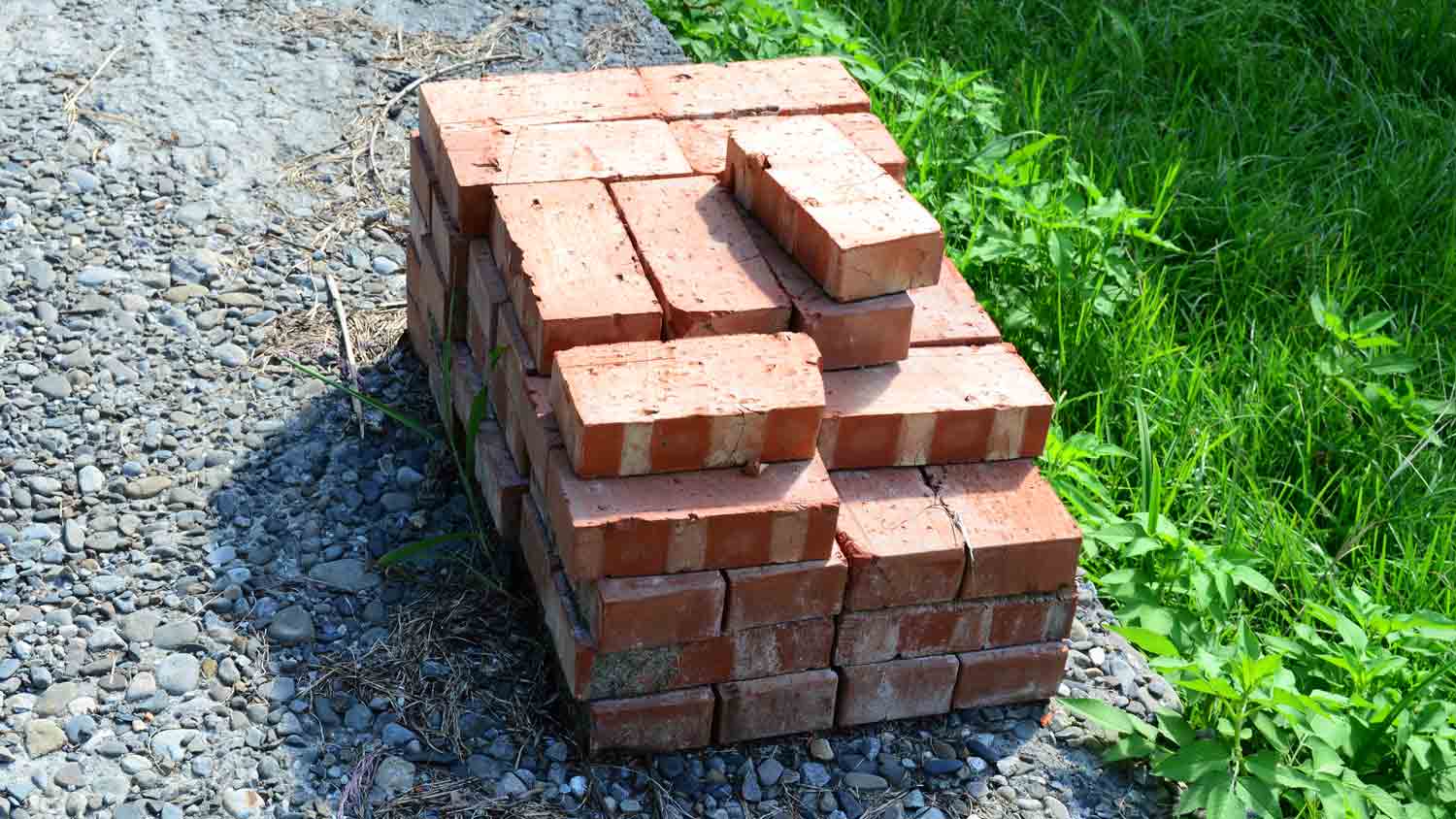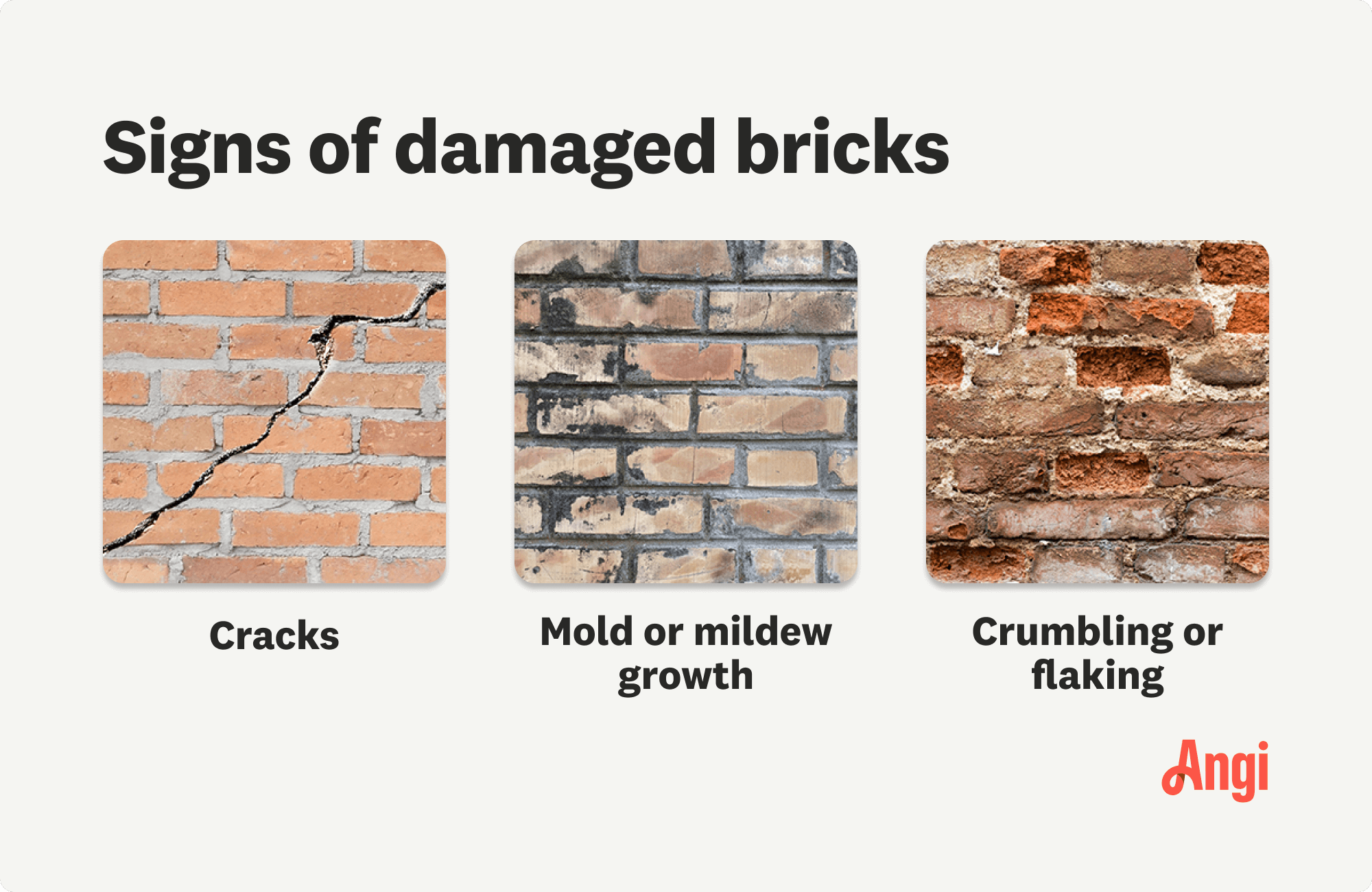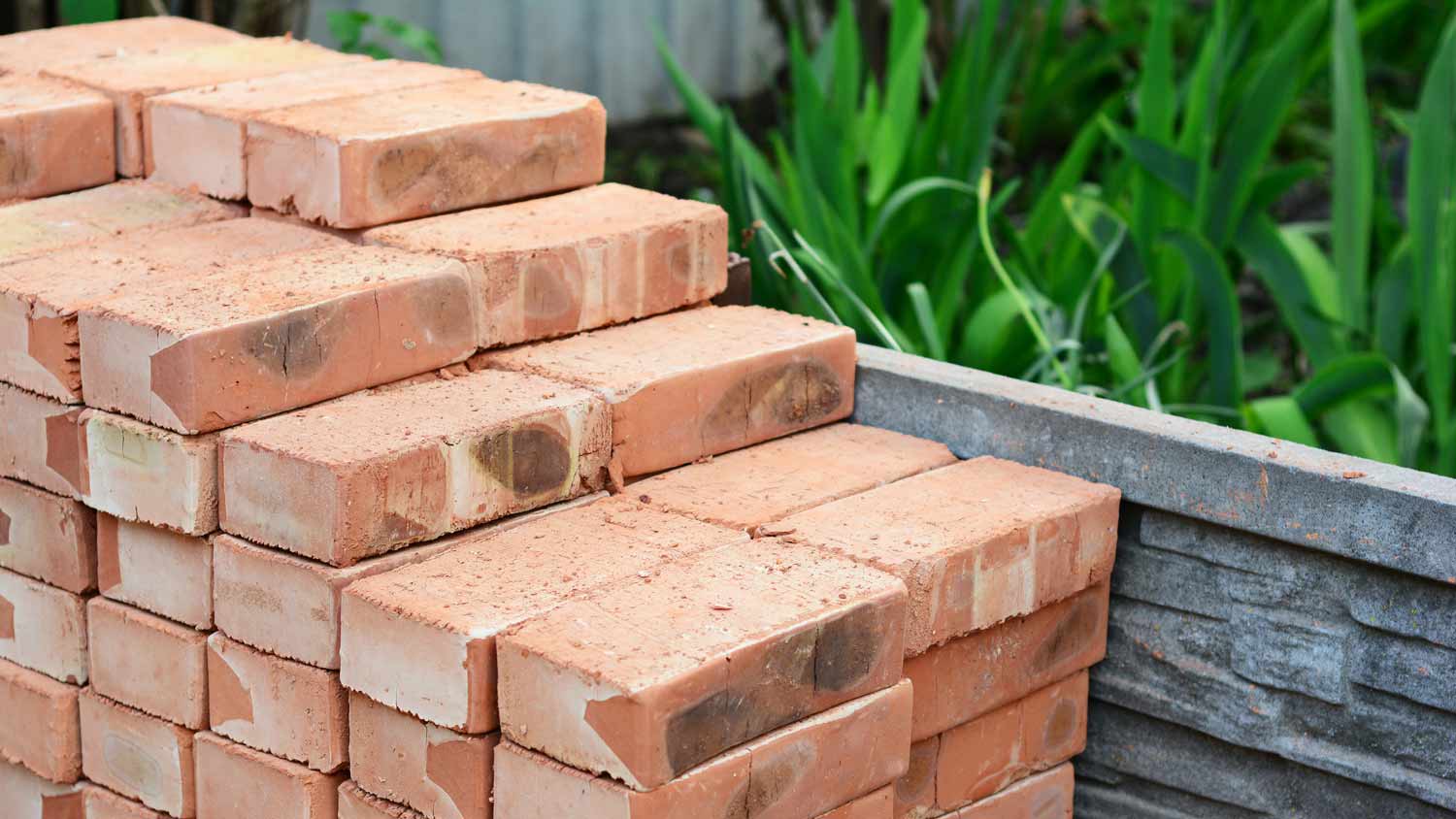
Factors like size, accessibility, and soil test results for oil leaks will determine the total cost of removing your oil tank.
Bricks may be tough, but getting rid of them is not


Whether you have unused bricks left over from a DIY project or you’ve carried out some demolition and have old bricks on hand, getting rid of this heavy material might seem difficult. In reality, it’s an easy process, and in some cases, it won’t even cost you any money. This guide lays out your options for how to dispose of bricks, why they don’t belong in your usual household trash, and ways to repurpose them for a more eco-friendly solution.
Brick is one of the most common building materials, so you can bet that there’s also a lot of brick waste produced each year from demolition projects and oversupply for construction projects. Not only is brick a prevalent material, but it doesn’t readily break down in landfills, so it’s important to keep it out of them as best as possible.
Brick is recyclable, to a degree, and going through the proper channels for disposing of brick responsibly can keep waste out of landfills and cut down on the negative environmental effects of mining for new clay and other materials. Disposing of bricks properly is an easy way to do your part to protect the environment.
There are plenty of ways to get rid of the brick waste on your property. The one that’s right for you will depend on how much waste you have and how much time and money you’re willing to spend on disposal.
Bricks are not usually accepted with typical household waste because they are considered construction debris, and the weight means any substantial amount of brick will require special waste removal.
Hiring a local junk removal service is one of the easiest options because these pros will come to your house and do all the work of picking up the bricks, loading them, and dropping them off at the correct waste depository. The cost of junk removal is $240 on average but can range from $60 to $600 depending on what you’re trying to offload. The more bricks you have, the more you’ll have to pay.
Just make sure you confirm with your junk hauler that the bricks will go to a recycling facility and not to a landfill.
If you’re comfortable getting your hands dirty and want to save a bit on labor costs, renting a dumpster might be worthwhile, depending on how much building debris you have. Depending on the type and size, you’ll pay a weekly cost to rent a dumpster of anywhere from $75 to $800. And while you have it for the week, you can also use it to get rid of most other construction debris, making it a great option for ongoing demolition or renovation projects.
Unfortunately, most of the debris you put into a dumpster will end up in a landfill, but you can try to find a dumpster rental company that will bring your waste, including bricks, to a recycling facility. You’ll often pay more for this service, as your professionals will need to spend time sorting the debris.

If you have a small number of bricks to get rid of, you may not even need to rent a dumpster. Pack what you have in a pick-up truck or the trunk of a large car so that the bricks won’t shift or fall during transportation—ideally tightly loaded in a sealed or strapped box.
Then, you can drop your bricks off at an appropriate waste disposal facility. For bricks, that will be a construction and demolition (C&D) waste center or an industrial waste landfill. Not sure where to find one? Contact your local government for more information, or use a search engine to locate the one nearest to you.
This option involves some work on your end and often comes with special dumping fees, but it will almost always be more affordable than renting a dumpster or hiring a professional junk hauling service.
Recycling is a great option if your bricks are in poor condition and you won’t be able to reuse them in the future—or if they’re in good condition but you need to get rid of them and can’t stomach seeing them off to a landfill. Unlike plastic, recycling centers can break down bricks and repurpose them into new materials. In many cases, the bits of crushed brick serve as aggregate for concrete in place of crushed gravel.
Bricks are not accepted with your usual recycling, so you’ll either need to schedule a pickup or plan to drop them off at a C&D recycling facility near you—which you can find using a search engine like this one. Keep in mind that these organizations likely won’t accept pickup requests for small quantities, so you’ll need to bring them in yourself if you’ve only got a few to unload.
With the proper facility, this service will be free, although you might pay for pickup if the company needs to travel to your location and load the bricks.


If your bricks are still in good shape, they might be good candidates for a material exchange program. Such associations accept old materials and give them to people and projects where needed. In turn, you’ll be able to sign up to receive goods and materials that you may need presently or down the line.
Before you jettison any leftover bricks you may have from building an outdoor pizza oven or laying down a new backyard path, consider reusing them in other projects. As long as they’re not crumbling or otherwise damaged—and you have the space to store them temporarily—there are many great ways to put bricks to work. Constructing a bird bath or a new garden bed are just a couple of ideas to help you get the creative ball rolling.

In some cases, you may even be able to recuperate costs from leftover bricks by selling them. Contact local contractors, builders, and hardware stores to gauge their interest, then sort through your supply and remove any bricks that aren’t up to snuff.
More likely, you’ll be able to sell the bricks via an online marketplace to another homeowner who has an upcoming project involving bricks. For the easiest disposal option, set your post settings to local pickup only so buyers will come to you.
If space is not an issue, consider storing leftover bricks so that you have them on hand for any projects or brick repairs that may arise. Of course, you’ll need to store them properly so you don’t find damage when you finally need to use them.
Keep bricks out of high humidity to prevent mold or mildew growth and out of freezing temperatures to limit cracking. And always place them where they’ll be protected from the elements, like a covered shed or in your garage.
Disposing of bricks can be time-consuming and physically demanding, but with a few tips, you’ll make the process a whole lot easier.
Consider paying for removal. To reduce the amount of physical labor you’ll have to do to dispose of your bricks, consider hiring someone else to do the hard work. Professionals and even local homeowners in need of bricks might be willing to load and haul away your bricks for you, although it often comes at a cost.
Wear braces and lift with your legs. If you do dispose of bricks yourself, wear a lifting brace and make sure you’re lifting with your legs to avoid back injuries.
Rent a truck. Even if you have a pickup truck that can fit and haul your bricks without issue, renting a moving truck from your local hardware store can keep your own vehicle in good condition. Rentals often come at a low enough cost per day to make it worthwhile.
Repurpose them on-site. The easiest way to deal with excess brick material on your property is just to repurpose it for another project. Consider walking paths, small retaining walls, raised garden bed walls, or even an outdoor pizza oven to make use of what would otherwise be debris.
On average, you’ll likely save a few hundred dollars by disposing of bricks yourself instead of hiring a professional junk hauler or renting a dumpster. However, it might not be worth the savings, depending on how many bricks you have to get rid of.
If you have just a small stack, hauling them to a recycling facility is probably your best bet and the most cost-effective option. If you have a large amount of bricks, a partial DIY job that involves renting a dumpster and placing the bricks in it yourself is likely best, but you should make sure the dumpster company will bring the bricks to a recycling facility and not a landfill.
However, while disposing of bricks is simple in theory, it’s time-consuming and back-breaking work. To prevent injury and save yourself time, hiring a professional to come pick them up and recycle them for you is the best option overall.
In some situations, homeowners or property owners may be responsible for arranging and overseeing cleanup efforts. This is especially true for DIY projects or smaller-scale renovations where a contractor is not involved.
From average costs to expert advice, get all the answers you need to get your job done.

Factors like size, accessibility, and soil test results for oil leaks will determine the total cost of removing your oil tank.

Mattresses are considered hazardous waste, so you’ll likely have to pay disposal fees. Use this guide on mattress removal costs to see what your total will be.

Need to get rid of paint, solvents, or other chemicals? Use this guide on hazardous waste disposal costs to see what professional removal will cost.

There are a variety of methods for disposing of electronics properly, from recycling to donating.

Ripped up old laminate floors for your dream home, or installing new ones? Learn how to dispose of laminate flooring if you have more than you need.

Need to get rid of old paint but not sure where to turn? Learn who disposes of old paint to avoid illegal dumping fees and prevent damage to the environment.